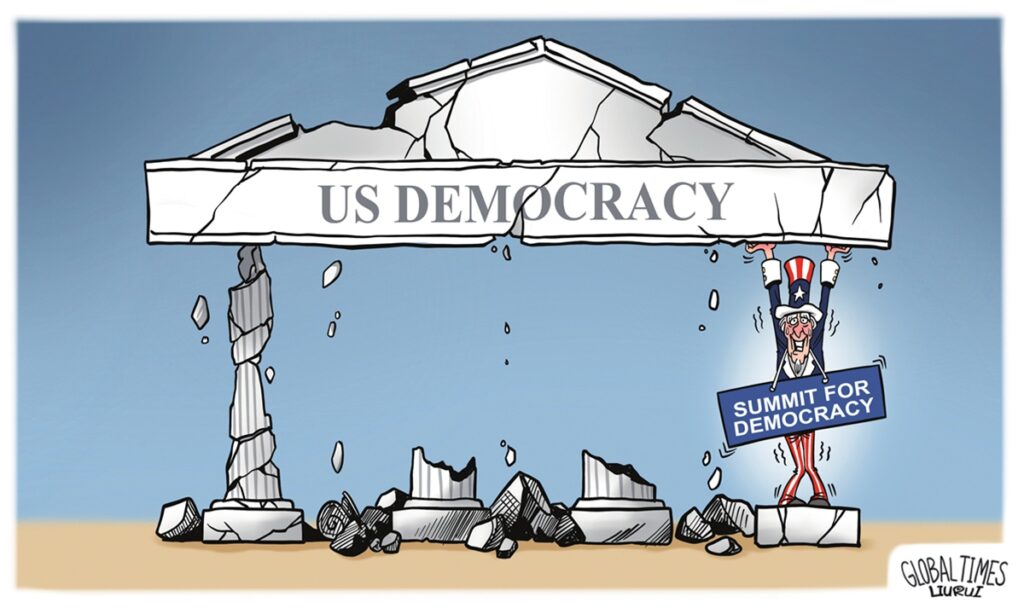US’ attempt to shape itself as the sole leader of the “democratic camp” through the Summit for Democracy won’t achieve the desired effect. This is primarily because the US cannot provide attractive leverage nor use its own performance to prove that being in the same camp as the US can help other countries obtain more benefits and larger room for development.
The White House announced on Tuesday that it will host a second Summit for Democracy on March 29 and 30, 2023, and Costa Rica, the Netherlands, Zambia and South Korea will act as co-hosts.
The first Summit for Democracy hosted by US President Joe Biden in December 2021 was snubbed. Among around 110 countries and regions invited by the US government, 89 came to the virtual gathering, according to media reports.
Compared with the time when Washington held the first summit, several changes have taken place in both the US and the world. Last year, the Biden administration controlled both the House and the Senate, while next year, the Republicans will take control of the House of Representatives. In this context, Biden’s decisions including in diplomacy will be constrained by the Republican Party. For the first Summit for Democracy, the Biden administration seemed quite ambitious, but its investment and ambition for the second one are projected to be much smaller.
Moreover, this year, many of the US’ commitment on global affairs such as the Ukraine crisis have turned out to be merely lip service, which heavily hit its prestige and credibility on the international stage.
Xu Liang, research fellow at the Chinese Academy of Social Sciences, told the Global Times that the so-called Summit for Democracy is actually directed at US’ perceived adversaries such as China and Russia. This indicates that Washington wants the participating countries to side with the US in containing China and Russia, which is a big challenge for most countries across the world, even including Washington’s allies.
The Russia-Ukraine conflict has helped many countries realize how selfish the US is. For the sake of expanding benefits and maintaining global hegemony, Washington will not hesitate to stab its allies. An increasing number of countries are reluctant to take sides between China and the US, or between Russia and the US.
Perhaps the US is also anxious that the scale and influence of the second Summit for Democracy will be much inferior to that of the first one. As a prescription, this time it invited Costa Rica, the Netherlands, Zambia and South Korea – representative countries of Latin America, Europe, Africa and Asia – to co-host the event. Given the four countries have relatively fewer frictions with other regional countries, Washington hopes they can attract more countries and regions to participate in the summit. But such attempts and efforts will turn to be a fool’s errand.
In November 2021, Hungarian Foreign Minister Peter Szijjarto criticized the Summit for Democracy for having features of domestic politics of the US.
At the same time that the summit serves US’ foreign policy, using values and ideology as a gimmick to rope in more countries to join US’ effort in containing China and Russia, it is also for the consideration of the country’s internal affairs.
Value-based diplomacy is in line with the US current political mainstream. And the Biden administration may believe that holding another Summit for Democracy will help the Democratic Party gain more support among voters in the 2024 presidential election.
When talking about the second Summit for Democracy, one Twitter user said, “the US should probably return to being a democracy before committing to hosting something like this.”
This is true. The US’ practice of democracy is increasingly worse, with rampant racism as well as gun violence and police abuse, for instance. Washington is not qualified to serve as a model for global democracies. Instead of effectively tackling its problems, Washington is attempting to privatize and weaponize democracy to deal with its adversaries. A summit for democracy held against this backdrop is doomed to be unpopular.
(Global Times)




